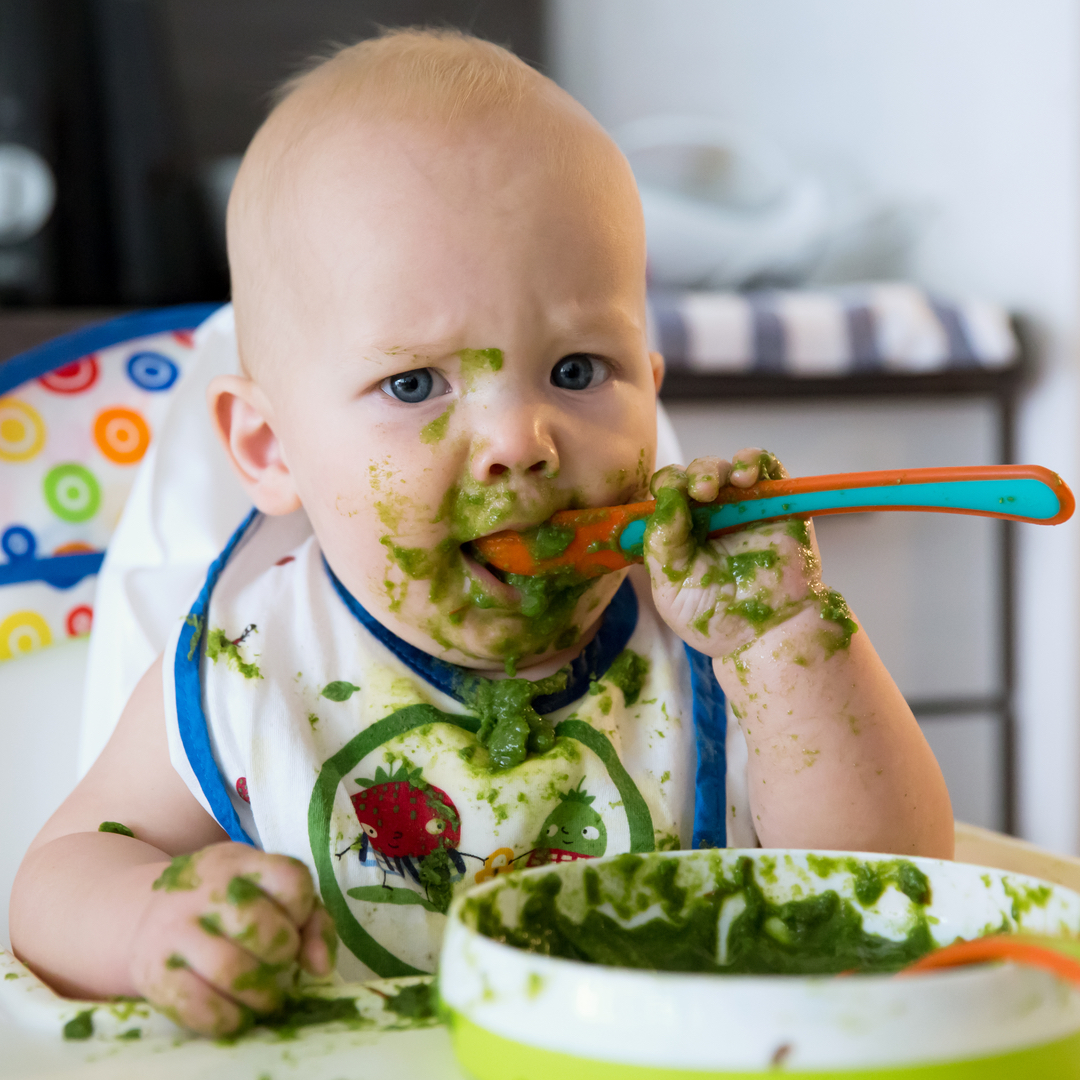
Successfully starting your baby on solids is an exciting milestone that opens up a whole new world of tastes and textures for your little one. It can be a fun and rewarding experience for both you and your baby. Here are some simple steps and tips to make the journey to start your baby on solids a smooth and enjoyable experience.
When To Start Your Baby On Solids
Most babies are ready to start solids around six months old. Look for signs like:
- Good head control: Your baby has good head control and can sit up with minimal support.
- Interest in food: Your baby watches you eat, reaches for your food, or opens their mouth when food comes their way.
- Loss of tongue-thrust reflex: Your baby can move food to the back of their mouth and swallow it, instead of pushing it out with their tongue.
First Foods
When starting solids, it’s important to begin with foods that are easy to digest and unlikely to cause allergies. Here are some great first foods:
- Single-grain cereals: Rice cereal or oatmeal mixed with breast milk or formula to a thin consistency.
- Pureed vegetables: Start with mild vegetables like carrots, sweet potatoes, or squash.
- Pureed fruits: Apples, pears, bananas, and peaches are excellent choices.
How to Start Your Baby On Solids
- Pick the Right Time: Choose a time when your baby is not too tired or too hungry. Mid-morning or early afternoon can be ideal.
- Use the Right Equipment: Have a baby spoon, a bib, and a high chair or a seat that provides support.
- Introduce One Food at a Time: Start with one single-ingredient food and wait three to five days before introducing another. This helps identify any potential allergies.
- Start with Small Amounts: Begin with just a teaspoon or two. Remember, the first few meals are more about getting used to the experience than actual eating.
Making It Fun To Start Your Baby On Solids
- Make Funny Faces: Babies love expressions. Show them how you enjoy the food by making funny faces and happy sounds.
- Sing a Song: Singing a silly song or making up a fun rhyme can make mealtime enjoyable.
- Let Them Play: Allow your baby to touch the food. It’s messy but helps them get used to different textures.
Watch for Positive and Negative Reactions
- Positive Reactions: If your baby smiles, opens their mouth, or reaches for more, these are good signs that they are enjoying the new food.
- Negative Reactions: If your baby turns their head away, spits out the food, or cries, don’t force it. Try again in a few days.
How to Progress Your Child Through Solids
As your baby gets used to eating solids, you can gradually introduce more variety and textures:
- Combination Foods: Mix different vegetables or fruits once they’ve tried each individually.
- Protein: Introduce pureed meats, beans, and tofu.
- Finger Foods: Around 8-10 months, you can offer small pieces of soft foods like cooked vegetables, soft fruits, and small bits of cheese.
Safety Tips
- Avoid Choking Hazards: Make sure foods are cut into small, manageable pieces.
- Stay Nearby: Always supervise your baby while they are eating.
- Watch for Allergies: Common allergens include eggs, peanuts, wheat, and dairy. Introduce these foods one at a time and watch for any reactions like rashes, vomiting, or difficulty breathing.
Encouraging Good Habits
- Eat Together: Make mealtime family time. Babies learn by watching you, so let them see you enjoying a variety of healthy foods.
- Stay Patient: Some babies may take longer to get used to solids. Keep offering a variety of foods without pressuring them.
- Healthy Choices: Encourage a taste for healthy foods by limiting sugary snacks and processed foods.
Troubleshooting
- Refusal to Eat: If your baby refuses to eat solids, don’t worry. It might take several attempts before they accept a new food.
- Constipation: Some babies may experience constipation when starting solids. Ensure they are getting enough fluids and offer fibre-rich foods like pureed prunes or pears.
Conclusion
Starting your baby on solids is a significant step in their growth and development. By following these simple tips and keeping a positive and relaxed attitude, you can make this transition smooth and enjoyable. Remember, every baby is different, so go at your baby’s pace and enjoy this new adventure together!
We’re here to support you
At OneOnOne Children’s Therapy, we believe that every child deserves the opportunity to grow and thrive.
Our clinics are not just a space for therapy – it’s a place where children can discover their strengths, overcome challenges, and reach their full potential.
By combining innovative therapy techniques with a stimulating and supportive environment, we’re proud to offer a holistic approach to paediatric therapy and early intervention that addresses the unique needs of each child we support.
Reach out for support
If you’re concerned about your child moving onto solids or want to learn more about how Speech Pathology can help your child’s feeding, OneOnOne Children’s Therapy is here to help.
Call our Bondi Junction and Mascot clinics on (02) 80657837 or email. You can book a free 30 minute phone call with us to discuss how we can support your child’s unique journey.
We are a dedicated team of Speech Pathologists, Occupational Therapists, Certified ESDM Therapists, and Psychologists, serving families in Bondi Junction and Mascot, Sydney’s Eastern suburbs. Our clinics are tailored to provide exceptional intervention for children with autism, developmental delays, disabilities, and learning difficulties, ensuring they receive the best possible care and support.
